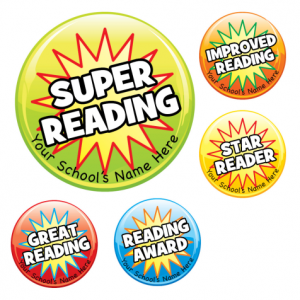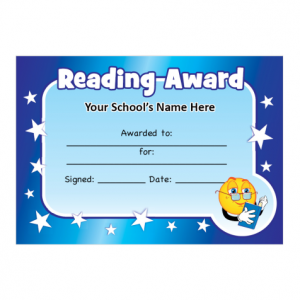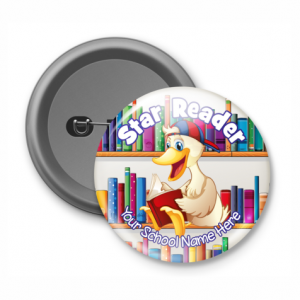Frank Cottrell Boyce, the British screenwriter and novelist has written for the likes of Doctor Who and collaborated with Danny Boyle, on the writing of the 2012 Olympic Ceremony opening.
The award winning screenwriter recently argued that by teachers encouraging students to read a text, analyse it and either respond or use it to create their own creative writing is turning literature into a chore rather than a pleasurable experience.
Boyce isn’t the only one with concerns. As reported by The Bookseller, teachers are finding it hard to teach kids the value of reading for pleasure as the current curriculum is too restrictive. The emphasis on teaching reading as a skill, the lack of time allowed for reading out loud to classes as well as a focus on literacy tests and prescriptive extracts limits the capacity to teach the enjoyment of reading.
What does this mean?
Children who read for pleasure are much more likely to do better in school compared to those who don’t, this is according to research conducted by the Institute of Education. It was also put forward that children’s vocabulary development, spelling, maths skills and concentration are all affected.
The National Literacy Trust’s 2012 survey found that children are reading less and are embarrassed to be seen reading. This we already knew, however what is more concerning is that children are developing more negative attitudes towards reading, with many believing that their parents don’t care whether they spend time reading or not.
Egmont Publishing have made some effort to dispel that though. Worried about the slow take off of children’s eBooks, The Guardian cites the Egmont research programme which followed 12 families and studied how children were spending their free time.
As expected, technology played a huge part in occupying children outside of the classroom, with Nintendo DS , television and the internet being the worst offenders.
Our Survey
In our recent School Sticker Survey we asked over 1,000 children about their activities outside of school.
We found internet usage was high with Facebook, Snapchat and Instagram being the most popular sites with 52.1% of children using Facebook. We found that the majority of children were spending an average of 1-2 hours on the internet using these sites with 18% spending 3 hours online a day.
Watching TV was unsurprisingly a popular activity with the average viewing time being 1-2 hours a day. Combine this with the average time spent using social media though and its 4 hours a day children are spending using technology for non related to school work.
If you consider the fact most children get up, have a quick fifteen minutes watching television and go straight to school. They then get home around 4pm and have their 3 1/2- 4 hours of technology, that ends up being 7:45pm, fit dinner and bath time in there and you can see why there seems to be no free time for parents to sit down and read with their children.
However Egmont revealed over half of parents said their child loves story time and that they’d like their children to read even more. 53% wish they had more time for reading with their child and 28% feel guilty that they don’t read to them more.
Although, the motives of parents encouraging children to read are not to teach their children about the joys of reading but rather to get them to top of the class according to Anna Davis, Editor at The London Evening Standard.
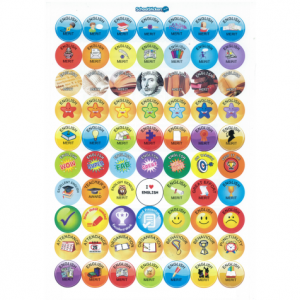 So what’s being done?
So what’s being done?
There are numerous campaigns now surrounding the importance of making sure children have the opportunity to read for pleasure.
The Society of Authors are campaigning so that children have better resources to give them access to fun and engaging books. The Reading for Pleasure campaign is fighting for three main things.
1. All primary and secondary schools to have a library and trained librarian.
2. More support for all teachers to inspire a love of reading for pleasure in all pupils.
3. Schools’ use of author visits and longer residencies should be accredited by Ofsted.
The Publishers Association has more recently launched a reading for pleasure campaign.
Eighty staff members at book publishers Pan Macmillan have pledged to support literacy charities as part of the Reading for Pleasure initiative. The company, one of the largest general book publishers in the UK, has offered all staff members one paid day per year to make time for working with literacy charities.
Editorial director at Pan Macmillan, Julie Crisp, offered to accompany an author to either a prison or school to hold a creative writing workshop. Speaking to The Bookseller, Julie said:
“Helping children to love books and to see the wonders of reading, rather than being afraid or ashamed of it, is essential. And it’s just as important for adults or teens who find reading difficult to work with someone to overcome their own prejudices and fears and to discover the genuine pleasure of reading books.”
My Thoughts
I remember the days of daily 1:1 reading to my primary school teacher, I didn’t like her much at the time, I found it to be an awkward experience. That, to me, is what the Reading for Pleasure Campaign is fighting against.
Luckily I had parents who read me bedtime stories and siblings who would sit down with me and read a children’s book, taking it in turns to read a page each. Encouragement, not forced reading is what’s needed.
Reading is fun! As an adult I feel like reading is one of my few vices and don’t know how I’d occupy my few empty moments if I wasn’t such an avid reader.
I also remember how dull the literature I was made to read during my school years was. The Caretaker and Robinson Crusoe aren’t necessarily the same books that appeal to children now as they did 50 years ago.
I think access to fun, new and popular books that children can read in their spare time at home is a great idea. Libraries should be widely accessible during school times and as much support that can be given should be.
However, the strain on teachers is considerable and that’s where School Stickers can lend a helping hand.
What can you do?
Here at school stickers we’re all about giving you the resources to encourage and reward your pupils and children. We leave the teaching to the teachers and the parenting to the parents.
We do however stock a range of fun and motivating literacy related products that you might find helpful.
Rewarding Literacy Stickers
Great for use at home or school, these brightly coloured stickers are a great way to reward children on their reading progress.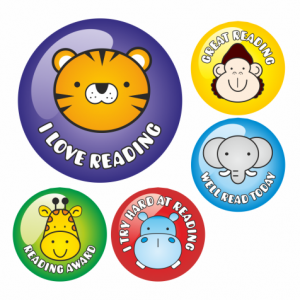
Literacy Badges and Awards
An alternative to our much loved stickers are our badges and awards that can be handed out as a weekly award or incentive. Great for making a child proud of the hard reading work they’ve done, both in and out of school.
All of our products can be customised to fit your needs and if your can’t find a pre-existing product on our site check out our Sticker Maker. You can design your own stickers and badges using your own images and colour schemes. Check out our step-by-step guide here.
What’s your view on teaching reading for pleasure in schools? Is the curriculum too restrictive and stopping you or do your students love to read? We’d love to hear your feedback and tips in the comments below.


